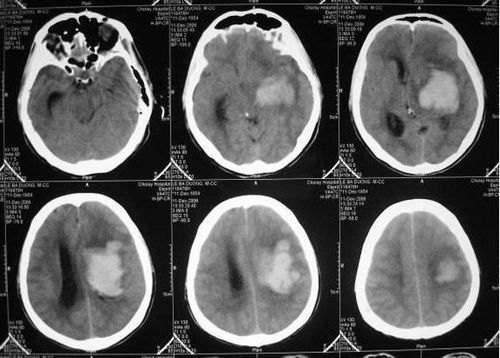This is an automatically translated article.
The article is advised by Master, Doctor Nguyen Viet Thu - Department of Diagnostic Imaging and Nuclear Medicine - Vinmec Times City International HospitalIntracranial hematoma is a hematoma in the skull that, if not diagnosed and detected early, can cause dangerous complications. The methods of endoscopic hematoma diagnosis such as CT scan, magnetic resonance imaging, angiography.
1. Learn about intracranial hematoma
Intracranial hematoma is a hematoma in the skull, usually caused by a ruptured blood vessel in the brain or trauma from a fall or traffic accident. An intracerebral hematoma may be located within the brain parenchyma or subcranially and may press on the brain.
Patients with intracerebral hematoma often present with symptoms such as:
Nausea, vomiting Headache Dizziness Gradual loss of consciousness Confusion Confusion Diaphragm unequal pupils on both sides Hemiplegia on the affected side Convulsions Kissing anesthesia Loss of consciousness Intracranial hematoma can occur even in the absence of injury following an injury or impact. There are 3 types of hematomas, including:
Subdural hematoma: occurs when a blood vessel ruptures at the location between the brain cavity and the dura, mostly in a vein. Subdural haemorrhage forms a hematoma that presses on the brain parenchyma. Large subdural hematomas can lead to a gradual loss of consciousness and even death. Epidural hematoma: occurs when a blood vessel bursts between the hard cavity and the skull, usually an artery. The patient may remain awake, but most often they are drowsy or comatose. Epidural hematoma affecting arteries if not timely intervention can lead to death Intracerebral hematoma: occurs when blood clots in the brain parenchyma, possibly due to hypertension, trauma, rupture of aneurysm brain circuit...
2. Diagnosis of intracranial hematoma
Intracranial hematoma can be difficult to diagnose early because the patient remains conscious after trauma. Therefore, patients are often diagnosed late and do not receive timely intervention. A number of medical techniques are applied in the diagnosis of intracranial hematomas, including:CT scan: also known as computed tomography X-rays are used to create detailed images of the brain, so a hematoma inside the brain can be detected. This is the most commonly used technique in the diagnosis of intracranial hematoma.

MRI scan: aka magnetic resonance imaging that uses radio waves and magnetic fields to create detailed images of the brain. Cerebral CT angiography: also known as computed tomography cerebral angiography: this is a technique that uses X-rays and contrast dye to create images of blood vessels inside the brain, applicable to suspected cases. suspect an aneurysm in the brain or other blood vessel problems. Symptoms may worsen after several weeks, so patients should be monitored for neurological signs, measured intracranial pressure, and performed repeat imaging procedures. Computed tomography, magnetic resonance imaging or computed tomography of cerebral blood vessels are all modern imaging methods widely used because of their superiority. These are all non-invasive techniques that are easy to perform and provide accurate results.
In short, an intracranial hematoma is a blood clot inside the brain that occurs after an injury, accident, impact or other underlying medical condition. Intracranial hematoma if not diagnosed and treated early can cause dangerous complications and can even lead to death. Some imaging methods such as MRI, CT Scan... Therefore, if you have an injury or an accident, you need to go to a medical facility immediately for examination, diagnostic tests and timely intervention.
In order to give accurate assessment and timely treatment of patients.
Currently, Vinmec International General Hospital has invested in modern CT, X-ray, MRI machines... combined with high quality medical examination and treatment services performed by doctors. , experienced professionals. As a result, the examination and treatment process always brings good results, helping patients to stabilize their health as well as minimize sequelae.
Please dial HOTLINE for more information or register for an appointment HERE. Download MyVinmec app to make appointments faster and to manage your bookings easily.














